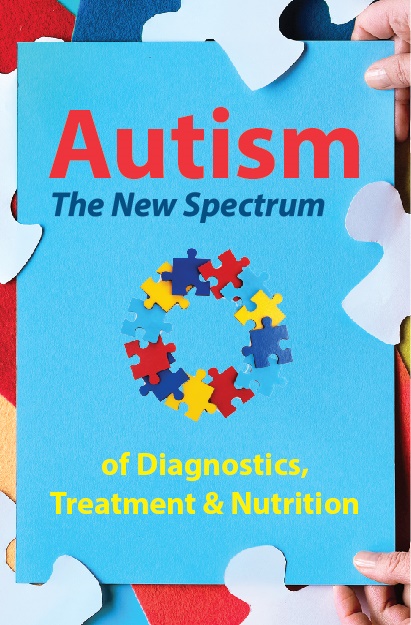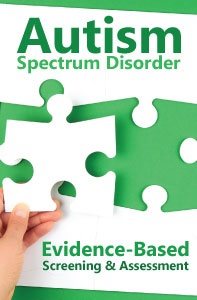We are launching our new website logins, account creation, and purchases are restricted. Any course activity is not being recorded until the new site has launched. Expected Launch Time 8:00pm EST Nov 20th.
$49

Related Courses

Animal-Assisted Therapy and the Healing Power of Pets

How Temperamental Differences Affect Young Children

Helping Your Young Client Persevere in the Face of Learning Differences

Autism Spectrum Disorder: Evidence-Based Screening & Assessment
Autism: The New Spectrum of Diagnostics, Treatment & Nutrition
Catherine Christie, PhD; Leo Christie, PhD, LMFT; Gina Ulery, MS, RDN, LDN
CE Credit: 4 Hours
Target Audience: Psychology CE | Counseling CE | Speech-Language Pathology CEUs | Social Work CE | Occupational Therapy CEUs | Marriage & Family Therapy CE | School Psychology CE | Teaching CE
Learning Level: Introductory
Course Abstract
Autism: The New Spectrum of Diagnostics, Treatment & Nutrition is a 4-hour online continuing education (CE/CEU) course that reviews diagnostic changes in autism as well as treatment options and nutrition interventions - both theoretical and applied.
The first section traces the history of the diagnostic concept of autism spectrum disorder (ASD), culminating in the revised criteria of the 2013 version of the Diagnostic and Statistical Manual of Mental Disorders, the DSM-5, with specific focus on the shift from five subtypes to a single spectrum diagnosis. The course aims to provide epidemiological prevalence estimates, identify factors that may play a role in causing ASD, and list the components of a core assessment battery. Brief descriptions of some of the major intervention models, that have some empirical support, are included.
Section two describes common GI problems and feeding difficulties in autism, exploring the empirical data and/or lack thereof regarding links between GI disorders and autism. Sections on feeding difficulties offer interventions and behavior change techniques.
A final section on nutritional considerations discusses evaluation of nutritional status, supplementation, and dietary modifications with an objective look at the science and theory behind a variety of nutrition interventions. Other theoretical interventions are also reviewed.
Course #40-54 | 2021 | 70 pages | 25 posttest questions
Learning Objectives
Professional Development Resources is approved by the American Psychological Association (APA) to sponsor continuing education for psychologists. Professional Development Resources maintains responsibility for this program and its content. Professional Development Resources is also approved by the National Board of Certified Counselors (NBCC ACEP #5590); the Association of Social Work Boards (ASWB #1046, ACE Program); the New York State Education Department's State Board for Mental Health Practitioners as an approved provider of continuing education for licensed marriage and family therapists (#MFT-0100 - Note: New York MFTs will receive 4 continuing education credit(s) for completing this self-study course); the Texas Board of Examiners of Marriage and Family Therapists (#114); and is CE Broker compliant (#50-1635 - all courses are reported within two business days of completion).
This online course provides instant access to the course materials (PDF download) and CE test. The course is text-based (reading) and the CE test is open-book (you can print the test to mark your answers on it while reading the course document).
Successful completion of this course involves passing an online test (80% required, 3 chances to take) and we ask that you also complete a brief course evaluation. Click here to learn more.
Have a question? Contact us. We’re here to help!
Catherine Christie, PhD, RDN, LDN, FADA, FAND, is Vice President of Professional Development Resources. She is a Past President of the Florida Academy of Nutrition and Dietetics and currently serves on the Board of Directors of the Academy of Nutrition and Dietetics. Cathy is co-author of four books including The Latino Food Lover’s Glossary, Fat is Not Your Fate, Eat to Stay Young and I’d Kill for a Cookie. Dr. Christie is also Editor of the Manual of Medical Nutrition Therapy. A Registered Dietitian Nutritionist, Fellow of the Preventative Cardiovascular Nurses Association and Fellow of the Academy of Nutrition and Dietetics, Dr. Christie earned her PhD from Florida State University and served for six years as the Chairman of the Dietetics and Nutrition Council, which regulates the nutrition profession in the state of Florida. Dr. Christie is the recipient of several awards and/or certifications including Florida’s Distinguished Dietitian, Florida Dietetic Association Outstanding Service Award, the Academy of Nutrition and Dietetics Outstanding Dietetic Educator Award, and the Excellence in Practice Award for Education in Nutrition and Dietetics.
Disclosure:
Financial: Receives a salary from Professional Development Resources, Inc.
Nonfinancial: No relevant nonfinancial relationships exist.
Leo Christie, PhD, LMFT, is a Florida-licensed Marriage and Family Therapist with a doctorate in Marriage and Family Therapy from Florida State University. Past President of the Florida Council on Family Relations, Dr. Christie is a past CEO of Professional Development Resources, a nonprofit corporation whose mission is to deliver continuing education credit courses to healthcare professionals throughout the United States. He has more than 20 years' experience in private practice with a specialty in child behavior disorders and as an instructor for over 500 live continuing education seminars for healthcare professionals.
Disclosure:
Financial: Receives a salary from Professional Development Resources, Inc.
Nonfinancial: No relevant nonfinancial relationships exist.
Gina Ulery, MS, RDN, LD/N, is the President and CEO of Professional Development Resources and a Registered Dietitian, licensed in the state of Florida. She earned her Master's degree in Health Science from the University of North Florida in 2003. Since then, she has used her experience and education to create online CE courses for healthcare professionals to further their careers and expand their knowledge base. Gina is responsible for managing day-to-day operations, as well as designing, implementing and facilitating marketing strategies.
Disclosure:
Financial: Receives a salary from Professional Development Resources, Inc.
Nonfinancial: No relevant nonfinancial relationships exist.
Customer Reviews